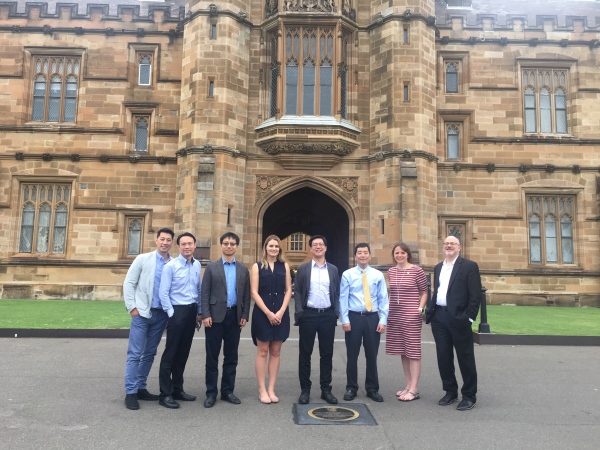 Our #DataImpactFellows programme has helped support early career researchers in different ways to develop data impact. Here, Rachel Oldroyd introduces us to the Digital Health Network, whose initial meeting was in Sydney in December 2018.
Our #DataImpactFellows programme has helped support early career researchers in different ways to develop data impact. Here, Rachel Oldroyd introduces us to the Digital Health Network, whose initial meeting was in Sydney in December 2018.
Between 8th and 12th December 2018, I attended the first meeting of the Digital Health Network at the University of Sydney. The network is funded through the World Universities Network (WUN) Research Development Fund (RDF) and the broad aim is to bring together health academics, engineers and clinicians to share experiences and develop working practices in multidisciplinary digital health research using big data.
Academics from Universities across the world gathered to discuss not only their research, but also the challenges of undertaking multidisciplinary research alongside potential solutions. Participating Universities included the University of Sydney, Chinese University of Hong Kong, Universities of Rochester, Southampton and Leeds, and Colombia University.
Discussions started around the definitions of the terms ‘digital health’ and ‘big data’.
The conventional definitions of big data were discussed, particularly the ‘five Vs’ which traditionally define the term:
- Velocity
- Volume
- Value
- Variety
- Veracity
What became apparent during the early stages of the meeting was that both the phrase ‘big data’ and ‘digital health’ are unpopular.
What constitutes ‘big data’ is extremely subjective not only across disciplines but also between individuals. A large dataset in the field of medicine may be considered small in another discipline.
The term is also personal to the individual researcher or clinician. Is a dataset ‘big’ if it is sufficiently large enough to force the analyst to switch from Excel, their analysis software of choice, to R? Is a dataset only classed as ‘big data’ if a High Performance Computer is required?
It was the general consensus that the areas of ‘big data’ and ‘digital health’ are not deserving of their titles.
One definition of digital health is the convergence of digital technologies, such as wearable devices and apps, with healthcare. Tracking individual data in this way maybe a relatively new and emerging field but it is one which is likely to continue. Is this new trajectory in healthcare deserving of the title ‘digital health’ or is it simply the way in which health research is developing in a progressively digital world?
Similarly, as technological advances facilitate the creation of cheap and readily available storage, large datasets become easier to handle and store and the definition of what constitutes a ‘big’ dataset organically changes over time. As a group we decided to adopt the alternative term ‘new forms of data’ which is less subjective and more accurately reflects the type of data which the phrase ‘big data’ often refers; such as social media data, electronic healthcare records, data generated through loyalty cards and personalised apps.
From the perspective of an early career researcher who has not had much contact with clinicians or medical engineers, I felt stretched as well as enlightened, especially as discussions moved into more medically orientated domains. However, hearing about the wide ranging applications of health-related research, both during the meetings and during the research open day, was fascinating.

Our hosts at the University of Sydney composed an excellent agenda for a research open day which included a series of talks from academics who are breaking ground in their fields. Multidisciplinary conferences are uncommon so having the opportunity to hear about health-related research from clinical, engineering and public health perspectives was widely appreciated.
The research open day focused on digital health and multidisciplinary collaboration and included talks on:
- Visualising regional prescribing data and patient journeys in the US (Martin Zand, University of Rochester);
- How digital health will both disrupt and improve the safety of healthcare (Andrew McLachlan, Sydney Pharmacy School);
- Big data for public health (Michelle Morris, University of Leeds);
- The Cerebral Palsy Alliance (Alistair McEwan, University of Sydney);
- Searching for clinical predictors using an endoscopic database (Chin Hur, Colombia University);
- Digital health and cardiovascular disease (Clara Chow, Westmead Applied Research Centre);
- A Machine learning model for blood pressure variability (Kelvin Tsoi, Chinese University Hong Kong);
- A new approach to community-wide screening for cognitive impairment (Michael Valenzuela, University of Sydney);
- Telehealth in the era of digital hospital (Jinman Kim, University of Sydney);
- The Hertfordshire cohort study (Nicholas Fuggle, University of Southampton); and
- Delivering mental health treatment to cancer survivors (Jill Newby, University of New South Wales).
I presented my work on the use of consumer generated data for disease and public health surveillance.
The research open day concluded with an insightful panel session focused on the challenges of interdisciplinary research and research training.

Emerging from the panel discussion, presentations and our WUN meetings, was that the benefits of undertaking multidisciplinary research are well understood and researchers are keen to work with colleagues in adjacent fields. Multidisciplinary teams foster the development of creative approaches to problem solving as different disciplines view challenges from contrasting perspectives.
Public health researchers and health geographers are often unable to work with individual level data and so tend to take a whole systems approach, typically using large national level datasets and aggregated data alongside creative modelling techniques, such as Agent Based Modelling and Microsimulation. Conversely, clinicians meet with individual patients on an everyday basis and therefore often overlook a whole systems approach, understandably focusing on individual-level interventions and results.
Our four day network meeting concluded with a discussion around the barriers and potential solutions for undertaking multidisciplinary health-related research in a progressively digital era, with plans to write a narrative article summarising the main issues.
Multidisciplinary research certainly has its advantages. A varied team can support each other in approaching a problem in an innovative way, but there will be challenges to overcome with regards to discipline specific language barriers, different thought processes and assumptions of ‘normality’ within disciplines.
Clearly lessons can be learnt from adjacent fields to create novel approaches to address some of the large healthcare and health-related challenges of the modern day.
About the author
Rachel Oldroyd is one of our UK Data Service Data Impact Fellows. Rachel is a quantitative human geographer based at theConsumer Data Research Centre (CDRC)at the University of Leeds, researching how different types of data (including TripAdvisor reviews and social media) are used to detect illness caused by contaminated food or drink.
